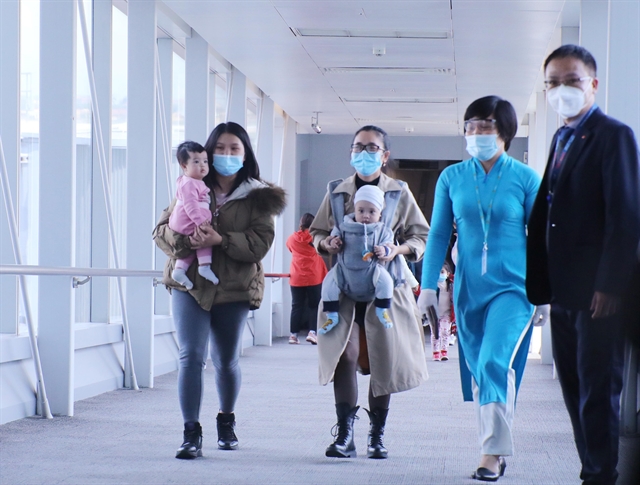 Society
Society


|
| Vietnamese citizens evacuated from Ukraine entering Việt Nam in the first repatriation flight on March 8, 2022, was exempted from the COVID-19 testing and vaccination requirement that are in effect. — VNA/VNS Photo Lâm Khánh |
HÀ NỘI — People seeking to gain entry into Việt Nam might not need COVID-19 vaccination certificates or proof of recent recovery, according to the latest draft proposal from the Ministry of Health.
The proposal, which has much more relaxed entry policies compared to previous iterations that have drawn widespread criticism, is addressed to ministries, Government bodies and local administrations in seeking feedback before Việt Nam completely reopens international tourism activities from March 15, 2022.
The draft regulations require air passengers to have proof of negative SARS-CoV-2 tests using RT-PCR/RT-LAMP method within 72 hours prior to departure, or 24 hours with rapid antigen tests, with the results approved by the countries where the tests are conducted.
Children under two years old are exempt from this testing rule.
There is also no need for entrants to take another COVID-19 test or quarantine post-entry, like the policy currently being implemented, but people would still need to comply with COVID-19 prevention and control measures that are applicable to people living in Việt Nam, like wearing masks, disinfecting hands, keeping a safe distance, making health declarations, and avoiding large gatherings.
For those entering Việt Nam via other routes, if they have valid COVID-19 tests, the policy is also similar to entrants by air.
If they haven’t had COVID-19 test results at the time of entry, they will need to undergo a test within 24 hours of entry (either RT-PCR/RT-LAMP or rapid antigen tests).
All entrants are required to submit health declarations prior to entry and use Việt Nam’s COVID-19 app (PC-COVID) during their entire stay in the country.
At the border gates, if the entrants show symptoms suspected of coronavirus infection – including but not limited to fever, coughing, sore throat, runny rose, blocked nose, body aches, fatigue, chills, reduced or complete loss of sense of smell and taste, headache, diarrhoea, breathing difficulties, and respiratory infection – they must report to the health workers at the border gates for appropriate medical measures.
They must practice preventive measures during travel from the border gates to the places of accommodation, and refrain from making rest stops along the way. If a rest stop is unavoidable in emergencies and special cases, they should avoid making contact with other people – especially people over 65 years old, pregnant women, or people with underlying health problems.
All children under two years old, even those who have not been inoculated against COVID-19 or contracted COVID-19 before, won’t need to be tested for the virus, and are allowed to take part in activities outside the places of accommodation along with their parents and relatives.
To date, nearly 100 per cent of the adult population in Việt Nam has received at least one dose of COVID-19 vaccine, while 98.3 per cent are fully vaccinated and 36.3 per cent have received a booster dose.
93.5 per cent of the children aged 12-17 years old have been full vaccinated, while the country is preparing to administer vaccines to children aged 5-11 years. — VNS




